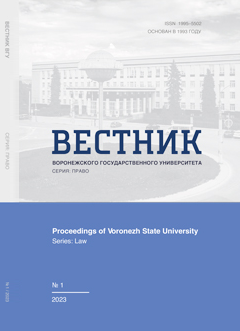Человекоцентризм в гражданском процессуальном праве: возвращение к истокам в условиях вызовов современности
Аннотация
В условиях современного технологического развития, охватившего все сферы общественной жизни, включая и сферу отправления правосудия, возрастает роль социального измерения этих преобразований. Поворот к фигуре «пользователя судебной системы» и выявлению его потребностей, интересов, а также восприятия им механизма судебной защиты непосредственно влияет на авторитет судебной власти, доверие населения к суду, эффективность правосудия и его роль в обществе. Современные исследования по всему миру отчетливо показывают возрастающий интерес именно к человекоцентризму в правосудии. Именно на основе социально-ориентированных данных можно выстроить наиболее адекватную систему, обеспечивающую защиту прав субъектов права, настроить ее под нужды меняющихся общественных отношений. Крайне важно осознавать, что именно человек находится в центре всех преобразований – именно человекоцентризм, позволяющий поставить человека, его благополучие и обеспечение защиты прав, свобод и законных интересов, способен выступить ответом на вызовы обезличенного технократического общества.
Скачивания
Литература
2. Argunov A. V. The space of justice. M. : Publishing House "Gorodets", 2021. 352 p.
3. Dubrovskaya T. V. Judicial discourse: speech behavior of a judge: dis. ... doc. philologist. Sciences. Saratov, 2010. 509 p.
4. Egorkin S. N. The phenomenon of prejudicial prejudice in civil proceedings // Bulletin of economic justice of the Russian Federation. 2017. No 1. P. 116–133.
5. Ermakova E. P. Reforms of civil litigation, arbitration and mediation in foreign countries 2014–2018 (Australia, England, Germany, Canada, USA, France). M. : Infotropic Media, 2018.
6. Zolotova O. I., Khashchina E. E. Psychological aspects of the organization of the civil process // Psychology and Law. 2021. Vol. 11, No 3. Р. 199–204.
7. Kurochkin S. A. Efficiency of civil proceedings. M., 2020.
8. Kurochkin S. A. The effectiveness of legal norms as a condition for the effectiveness of legal influence (on the example of procedural law) // Uchenye zapiski Kazanskogo Universiteta. Humanities series. 2020. Vol. 162, book. 2. P. 69–83.
9. Mishutina E. I. Axiological aspects in civil procedural law: author. dis. ... cand. legal Sciences. Saratov, 2012. 22 p.
10. Pechegina P. D. Tasks of civil legal proceedings: dis. ... cand. legal Sciences. M., 2022. 201 p.
11. Puchkov S. A. The problem of unconscious motivation in court decisions // Nalogoved. 2018. No 7. Р. 74–81.
12. Rusakova E. P. The impact of digitalization on civil litigation in Russia and abroad: the experience of China, India, Singapore, the European Union, the USA, South Africa and some other countries: dis. ... doc. legal Sciences. M., 2021.
13. The complexity of Russian laws. Experience of parsing [Text] / A. V. Knutov [et al.]; National research University "Higher School of Economics". M. : Ed. house of the Higher School of Economics, 2020. 311 p.
14. Tikhomirov Yu. A. Behavioral mechanism of action of law // Issues of state and municipal management. 2011. No 4. Р. 92–105.
15. Tomac A. I. Implementation of the principle of competitiveness in civil proceedings in the context of the development of information technologies: dis. ... cand. legal Sciences. M., 2021. 214 p.
16. Fogelson Yu. B. Legal consciousness of Russian judges and its reflection in the judicial practice of higher courts // Law. 2018. No 1. P. 108–126.
17. Digital technologies in civil and administrative proceedings: practice, analytics, prospects / M. V. Samsonova [et al.] ; ed. E. G. Streltsova. M. : Infotropic Media, 2022. 336 p.
18. American Academy of Arts and Sciences, Measuring Civil Justice for All: What Do We Know? What Do We Need to Know? How Can We Know It? (Cambridge, Mass.: American Academy of Arts and Sciences, 2021).
19. Burstyner N., Sourdin T., Liyanage C., Ofoghi B., Zeleznikow J. Using Technology to Discover More About the Justice System // Rutgers Computer & Technology Law Journal. 2018. Vol. 44, Issue 1.
20. European Commission Directorate-General for Economic and Financial Affairs. The Economic Impact of Civil Justice Reforms. Dimitri Lorenzani, Federico Lucidi. Economic Papers 530, September 2014.
21. European Commission, Directorate-General for Justice, Assessment of the socio-economic impacts of the policy options for the future of the European Small Claims Regulation: final report, Publications Office, 2014).
22. European judicial systems. CEPEJ Evaluation Report. 2020 Evaluation cycle (2018 data). Part 1 Tables, graphs and analyses. European judicial systems. Efficiency and quality of justice. An overview. CEPEJ STUDIES No 26, 2018 Edition (2016 data).
23. Inchausti G. F. The 2017 Directive Proposal on Common Minimum Standards of Civil Procedure in the European Union // The Future of the European Law of Civil Procedure. Coordination or Harmonisation? Ed. by Fernando Gascón Inchausti, Burkhard Hess. Intersentia, 2020.
24. Genn H. Paths to Justice: What People Do and Think About Going To Law. Hart Publishing, 1999.
25. Genn H. Judging Civil Justice, Cambridge University Press, 2010.
26. Hagan M. D. A Human-Centered Design Approach to Access to Justice: Generating New Prototypes and Hypotheses for Intervention to Make Courts User-Friendly // Indiana Journal of Law and Social Equality. 2018. Vol. 6, Iss. 2. P. 199–239.
27. Lupica L. R., Grant G. Will Human-Centered Legal Design Improve Civil Justice Systems? An How Will We Ever Know? // Legal Design Perspectives: Theoretical and Practical Insights from the Field. Rossana Ducato and Alain Strowel (eds). Ledizioni, 2021. P. 117–138.
28. Orr L. A. Judicial Factfinding in an Age of Rapid Change: Creative Reforms From Abroad // Harvard Law Review Forum. 2017. Vol. 130.
29. Philips S. Ideology in the Language of Judges: How Judges Practice Law, Politics and Courtroom Control. New York ; Oxford : Oxford University Press, 1998. 205 p.
30. Salter S., Thompson D. Public-Centred Civil Justice Redesign: A Case Study of the British Columbia Civil Resolution Tribunal // McGill Journal of Dispute Resolution. 2016–2017. Vol. 3, No 44. P. 113–136.
31. Toohey L., Moore M., Dart K., Toohey D. Meeting the Access to Civil Justice Challenge: Digital Inclusion, Algorithmic Justice, and Human-Centered Design // Macquarie Law Journal. 2019. Vol. 19. P. 133–156.
32. Tracy K., Caron M. How the Language Style of Small-Claims Court Judges Does Ideological Work // Journal of Language and Social Psychology. 2016. June 1–22
33. Uzelac A. Towards European Rules of Civil Procedure: Rethinking Procedural Obligations // Hungarian Journal of Legal Studies 58. 2017. No 1. Р. 3–18.
34. Quintanilla V. D., Yontz M. A. Human-Centered Civil Justice Design: Procedural Justice and Process Value Pluarlism // Tulsa Law Review. 2018. Vol. 54, Iss. 1. P. 113–138.
35. Quintanilla V. D. Human-Centered Civil Justice Design // Penn State Law Review. 2017. Vol. 121, Iss. 3. P. 745–806.
36. Yang L., Yi J., Peng H. Big-Data Measurement-Model Research about Judges’ Actual Workload in China // Asian Journal of Law and Society. 2020. Vol. 7. P. 541–560.










